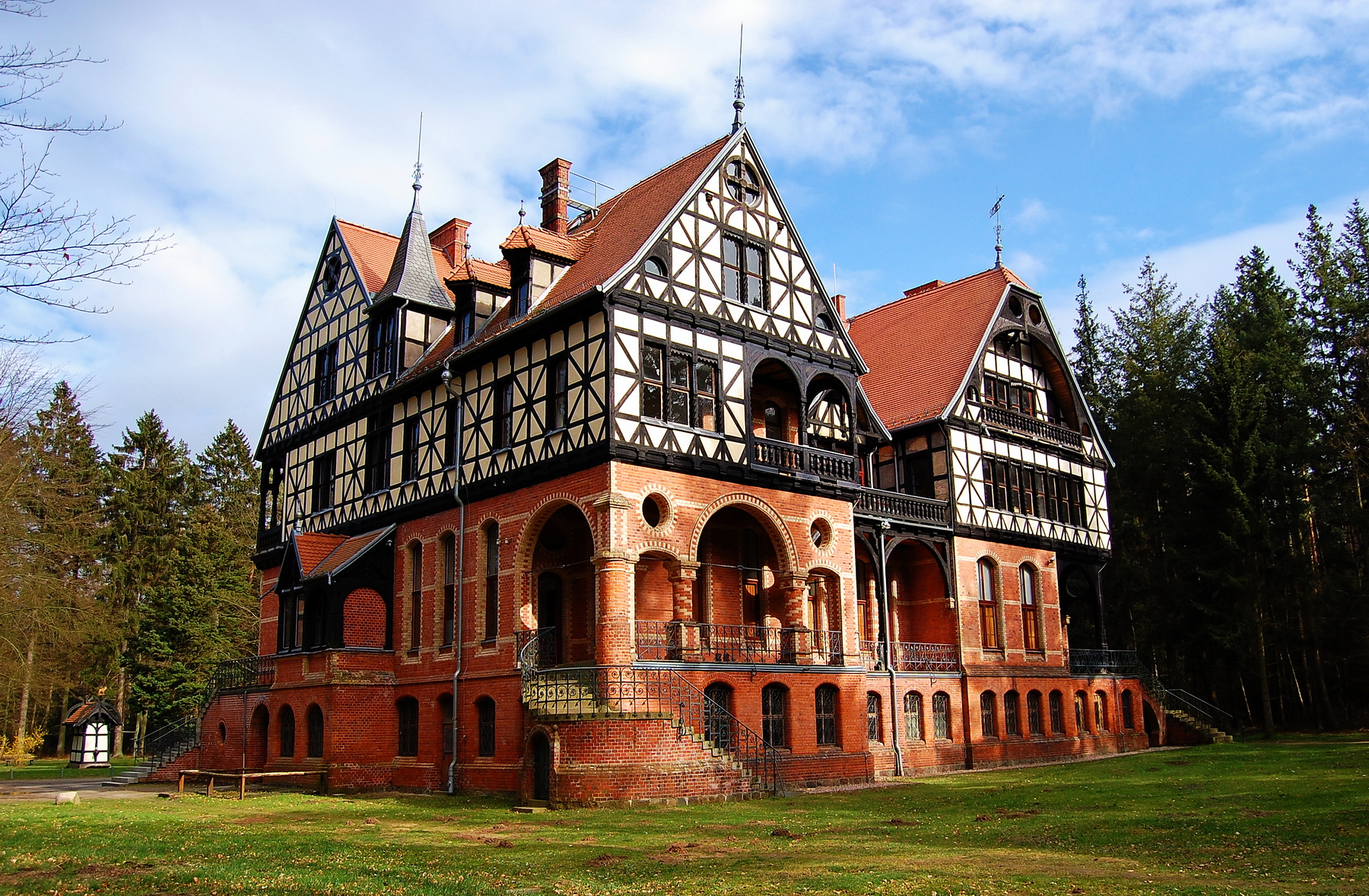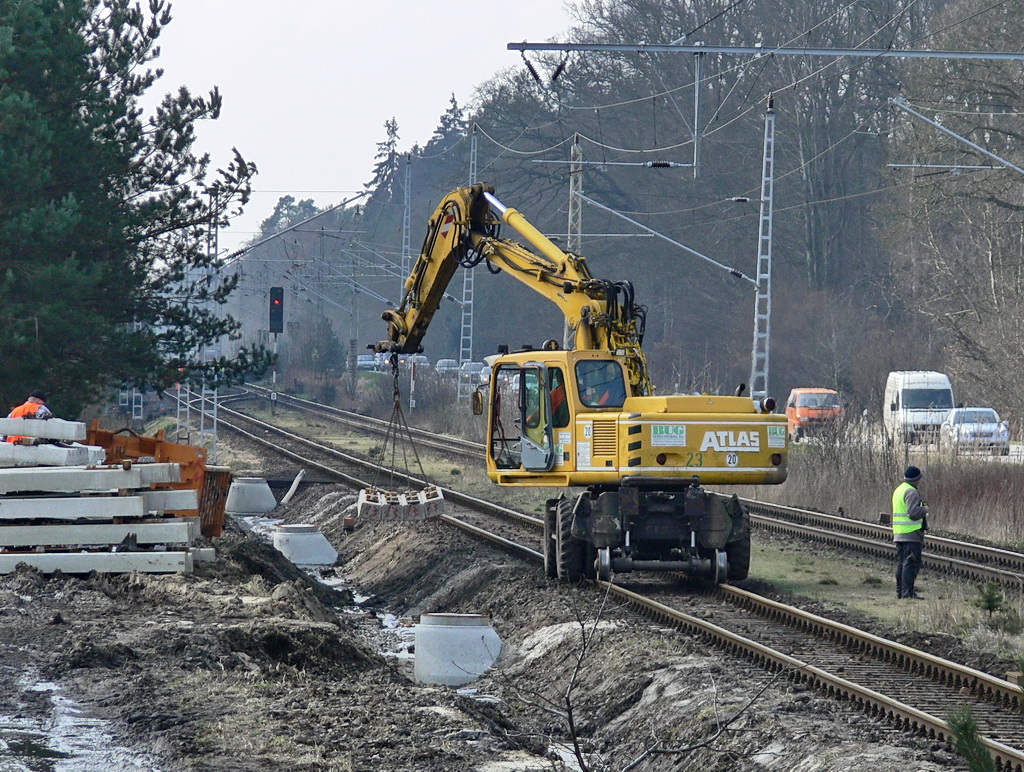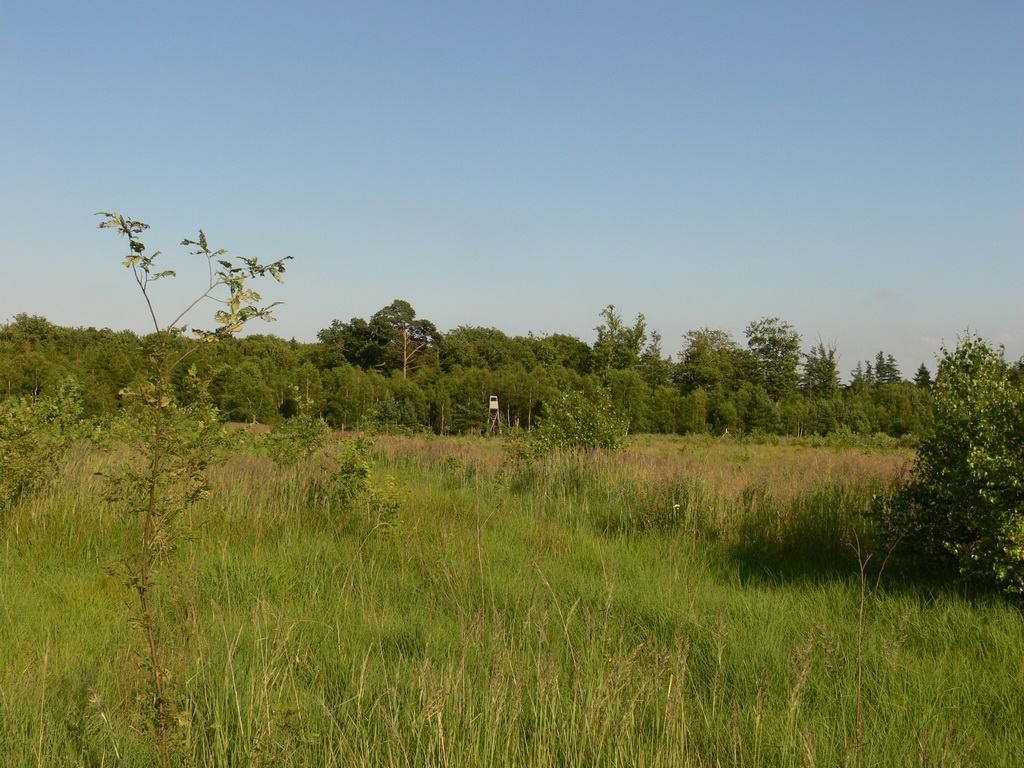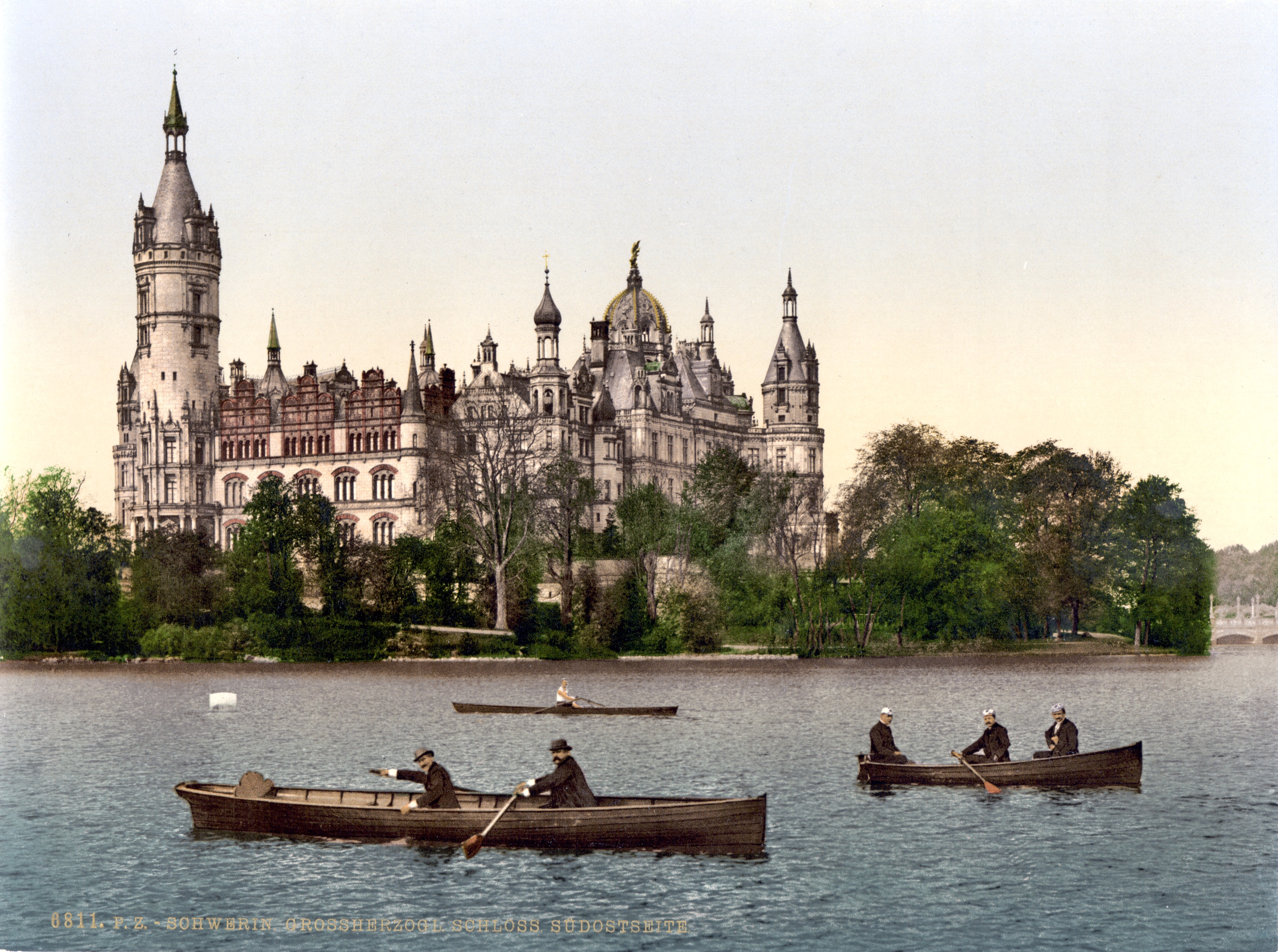|
Gelbensande
Gelbensande is a municipality in the German state of Mecklenburg-Vorpommern. It is located in the Rostock district, near Rostock, Ribnitz-Damgarten and Stralsund. Four other villages are part of Gelbensande. Gelbensande is about from the Baltic Sea coast. It can be reached by car on B 105, as well as by train ( Stralsund–Rostock railway). Hunting lodge ''Jagdschloss Gelbensande'' is a hunting lodge or manor that was erected between 1880 and 1885 as a summer residence for Grand Duke Friedrich Franz III of Mecklenburg-Schwerin. After 1887, it was used as a base for hunting in the surrounding forest, the Rostock Heath. Because of the Grand Duke's marriage to one of the Russian Tsar's granddaughters, the Mecklenburg-Russian relationships can still be seen inside the castle today. The ''Jagdschloss'' remained in the Grand Duke's use until 1944. It was subsequently used as an army hospital, a sanatorium for tuberculosis, a public library, a veteran's club and a sort of hostel ... [...More Info...] [...Related Items...] OR: [Wikipedia] [Google] [Baidu] |
Stralsund–Rostock Railway
The Stralsund–Rostock railway connects the two Hanseatic cities in the north of the German state of Mecklenburg-Vorpommern. The single-track electrified main line is part of the German Unity Transport Project (german: Verkehrsprojektes Deutsche Einheit) No. 1 (Lübeck–Rostock–Stralsund). History The railway line was built to provide a direct rail link between the two Hanseatic cities of Rostock and Stralsund and to open up the area in between. Prussia proposed a single-track main line, while Mecklenburg considered that a branch line would be sufficient. The concession was authorised by a treaty of 15 December 1884. The track was built by the Prussian state railways and officially opened on 1 July 1888. The Mecklenburg government participated only financially. The line crossed the boundary between the Grand Duchy of Mecklenburg-Schwerin and the Prussian province of Pomerania between Ribnitz and Damgarten. The original plan was that the Stralsund–Ribnitz section would ru ... [...More Info...] [...Related Items...] OR: [Wikipedia] [Google] [Baidu] |
Jagdschloss
A ''Jagdschloss'' is a hunting lodge in German-speaking countries. It is a '' schloss'' set in a wildlife park or a hunting area (such as a forest, field or by a lake) that served primarily as accommodation for a ruler or aristocrat and his entourage while hunting in the area. Characteristics A ''Jagdschloss'' was often the venue for a banquet accompanying a hunt, and sometimes it also hosted festivals and other events. The term ''Jagdschloss'' is often equated to the '' Lustschloss'' or '' maison de plaisance'', particularly as the hunt was also a recreational activity. However, a ''Lustschloss'' and ''Jagdschloss'' differ in function as well as architecture. The layout and furnishing of a ''Lustschloss'' is unconstrained, while that of a ''Jagdschloss'' is always related to hunting: the walls may be adorned with antlers and other trophies, with scenes of hunting, and also by a deliberate use of wood or other natural materials. A ''Jagdschloss'' could also be very lavishly fur ... [...More Info...] [...Related Items...] OR: [Wikipedia] [Google] [Baidu] |
Rostock Heath
Rostock Heath (german: Rostocker Heide) is a wood and heathland region northeast of the German city of Rostock. It has a total area of about 6000 hectares and, since 1252, has been owned by the Hanseatic city of Rostock. As a result of its ownership of the Rostock Heath, Rostock is today one of the five largest communal woodland owners in Germany. In the district of Rostock is the sub-district (''Amt'') of Rostocker Heide with its head office in the village of Gelbensande. Geography The wood and heathland region northeast of the city of Rostock is the "Northeast Heath of Mecklenburg" (''Nordöstliche Heide Mecklenburgs''). This includes the Rostock Heath as well as the '' Gelbensande Forest'', the forest of ''Alte Heide'' and part of the Ribnitz Forest. The wooded region is the remnant of an ancient forest that once stretched from the Netherlands to Pomerania. Rostock Heath covers an area from the Baltic Sea coast between Warnemünde and Wiederort, west of Graal-Mürit ... [...More Info...] [...Related Items...] OR: [Wikipedia] [Google] [Baidu] |
Rostock (district)
Rostock (german: Landkreis Rostock) is a district in the north of Mecklenburg-Vorpommern, Germany. It is bounded by (from the west and clockwise) the district Nordwestmecklenburg, the Baltic Sea, the district-free city Rostock and the districts Vorpommern-Rügen, Mecklenburgische Seenplatte and Ludwigslust-Parchim. The district seat is the town Güstrow. History Rostock District was established by merging the former districts of Bad Doberan and Güstrow as part of the local government reform of September 2011. The name of the district was decided by referendum on 4 September 2011. The project name for the district was ''Mittleres Mecklenburg''. Geographic features There are a number of lakes within the boundaries of Rostock district, including: * Inselsee * Hohen Sprenzer See * Krakower See Krakower See is a lake in the Rostock district in Mecklenburg-Vorpommern, Germany Germany,, officially the Federal Republic of Germany, is a country in Central Europe. It is ... [...More Info...] [...Related Items...] OR: [Wikipedia] [Google] [Baidu] |
Friedrich Franz III, Grand Duke Of Mecklenburg-Schwerin
Frederick Francis III (german: Friedrich Franz Paul Nikolaus Ernst Heinrich; 19 March 1851 – 10 April 1897) was the penultimate Grand Duke of Mecklenburg-Schwerin. Biography He was born in Schloss Ludwigslust as the son of Frederick Francis II, Grand Duke of Mecklenburg-Schwerin and his first wife Princess Augusta Reuss of Köstritz. He succeeded his father as Grand Duke on 15 April 1883. From an early age Frederick Francis suffered from asthma and severe breathing difficulties. He could not live in the north of Europe and lived instead on the shores of the Mediterranean, where the mild climate agreed with him. His homosexuality was an open secret. Frederick Francis' death in Cannes on 10 April 1897 is shrouded in mystery, as he was originally reported to have committed suicide by throwing himself off a parapet of a bridge. According to the official account of his death, however, he was in his garden when he experienced breathing difficulties and staggered around before falling ... [...More Info...] [...Related Items...] OR: [Wikipedia] [Google] [Baidu] |
Kaiser
''Kaiser'' is the German word for " emperor" (female Kaiserin). In general, the German title in principle applies to rulers anywhere in the world above the rank of king (''König''). In English, the (untranslated) word ''Kaiser'' is mainly applied to the emperors of the unified German Empire (1871–1918) and the emperors of the Austrian Empire (1804–1918). During the First World War, anti-German sentiment was at its zenith; the term ''Kaiser''—especially as applied to Wilhelm II, German Emperor—thus gained considerable negative connotations in English-speaking countries. Especially in Central Europe, between northern Italy and southern Poland, between western Austria and western Ukraine and in Bavaria, Emperor Franz Joseph I is still associated with "Der Kaiser (the emperor)" today. As a result of his long reign from 1848 to 1916 and the associated Golden Age before the First World War, this title often has still a very high historical respect in this geographical ... [...More Info...] [...Related Items...] OR: [Wikipedia] [Google] [Baidu] |
Wilhelm, German Crown Prince
Wilhelm, German Crown Prince, Crown Prince of Prussia (Friedrich Wilhelm Victor August Ernst; 6 May 1882 – 20 July 1951) was the eldest child of the last ''Kaiser'', the German Emperor, Wilhelm II, and his consort Augusta Victoria of Schleswig-Holstein. As Emperor Wilhelm's heir, he was the last Crown Prince of the German Empire and the Kingdom of Prussia. Wilhelm became crown prince at the age of six in 1888, when his grandfather Frederick III died and his father became emperor. He was crown prince for 30 years until the fall of the empire on 9 November 1918. During World War I, he commanded the 5th Army from 1914 to 1916 and was commander of the Army Group German Crown Prince for the remainder of the war. After his return to Germany in 1923, he fought the Weimar Republic and campaigned for the reintroduction of the monarchy in Germany. After his plans to become president had been blocked by his father, Wilhelm supported Adolf Hitler's rise to power, but when Wilhel ... [...More Info...] [...Related Items...] OR: [Wikipedia] [Google] [Baidu] |
German Reunification
German reunification (german: link=no, Deutsche Wiedervereinigung) was the process of re-establishing Germany as a united and fully sovereign state, which took place between 2 May 1989 and 15 March 1991. The day of 3 October 1990 when the German Reunification Treaty entered into force dissolving the German Democratic Republic (GDR; german: link=no, Deutsche Demokratische Republik, DDR, or East Germany) and integrating its recently re-established constituent federated states into the Federal Republic of Germany (FRG; german: link=no, Bundesrepublik Deutschland, BRD, or West Germany) to form present-day Germany, has been chosen as the customary '' German Unity Day'' () and has thereafter been celebrated each year from 1991 as a national holiday. East and West Berlin were united into a single city and eventually became the capital of reunited Germany. The East Germany's government led by the Socialist Unity Party of Germany (SED) (a communist party) started to falter on 2 ... [...More Info...] [...Related Items...] OR: [Wikipedia] [Google] [Baidu] |
Tuberculosis
Tuberculosis (TB) is an infectious disease usually caused by ''Mycobacterium tuberculosis'' (MTB) bacteria. Tuberculosis generally affects the lungs, but it can also affect other parts of the body. Most infections show no symptoms, in which case it is known as latent tuberculosis. Around 10% of latent infections progress to active disease which, if left untreated, kill about half of those affected. Typical symptoms of active TB are chronic cough with hemoptysis, blood-containing sputum, mucus, fever, night sweats, and weight loss. It was historically referred to as consumption due to the weight loss associated with the disease. Infection of other organs can cause a wide range of symptoms. Tuberculosis is Human-to-human transmission, spread from one person to the next Airborne disease, through the air when people who have active TB in their lungs cough, spit, speak, or sneeze. People with Latent TB do not spread the disease. Active infection occurs more often in people wi ... [...More Info...] [...Related Items...] OR: [Wikipedia] [Google] [Baidu] |
Russian Tsar
Tsar ( or ), also spelled ''czar'', ''tzar'', or ''csar'', is a title used by East and South Slavic monarchs. The term is derived from the Latin word ''caesar'', which was intended to mean "emperor" in the European medieval sense of the term—a ruler with the same rank as a Roman emperor, holding it by the approval of another emperor or a supreme ecclesiastical official (the Pope or the Ecumenical Patriarch)—but was usually considered by western Europeans to be equivalent to "king". It lends its name to a system of government, tsarist autocracy or tsarism. "Tsar" and its variants were the official titles of the following states: * Bulgarian Empire ( First Bulgarian Empire in 681–1018, Second Bulgarian Empire in 1185–1396), and also used in Tsardom of Bulgaria, in 1908–1946 * Serbian Empire, in 1346–1371 * Tsardom of Russia, in 1547–1721 (replaced in 1721 by ''imperator'' in Russian Empire, but still remaining in use, also officially in relation to several regi ... [...More Info...] [...Related Items...] OR: [Wikipedia] [Google] [Baidu] |
Grand Duchy Of Mecklenburg-Schwerin
The Grand Duchy of Mecklenburg-Schwerin was a territory in Northern Germany held by the House of Mecklenburg residing at Schwerin. It was a sovereign member state of the German Confederation and became a federated state of the North German Confederation and finally of the German Empire in 1871. Geography Like its predecessor, the Duchy of Mecklenburg-Schwerin, the Schwerin lands upon the incorporation of the extinct Duchy of Mecklenburg-Güstrow in 1701 comprised the larger central and western parts of the historic Mecklenburg region. The smaller southeastern part was held by the Duchy of Mecklenburg-Strelitz branch of the grand ducal house, who also ruled over the lands of the former Bishopric of Ratzeburg in the far northwest. The grand duchy was bounded by the Baltic coast in the north and the Prussian province of Pomerania in the northeast, where the border with the Hither Pomeranian (formerly Swedish Pomeranian) region ran along the Recknitz river, the Peene, an ... [...More Info...] [...Related Items...] OR: [Wikipedia] [Google] [Baidu] |
Municipalities Of Germany
MunicipalitiesCountry Compendium. A companion to the English Style Guide European Commission, May 2021, pages 58–59. (german: Gemeinden, singular ) are the lowest level of official territorial division in . This can be the second, third, fourth or fifth level of territorial division, depending on the status of the municipality and the '' Land'' (federal state) it is part of. The city-states Berlin and Hamburg are second-l ... [...More Info...] [...Related Items...] OR: [Wikipedia] [Google] [Baidu] |








